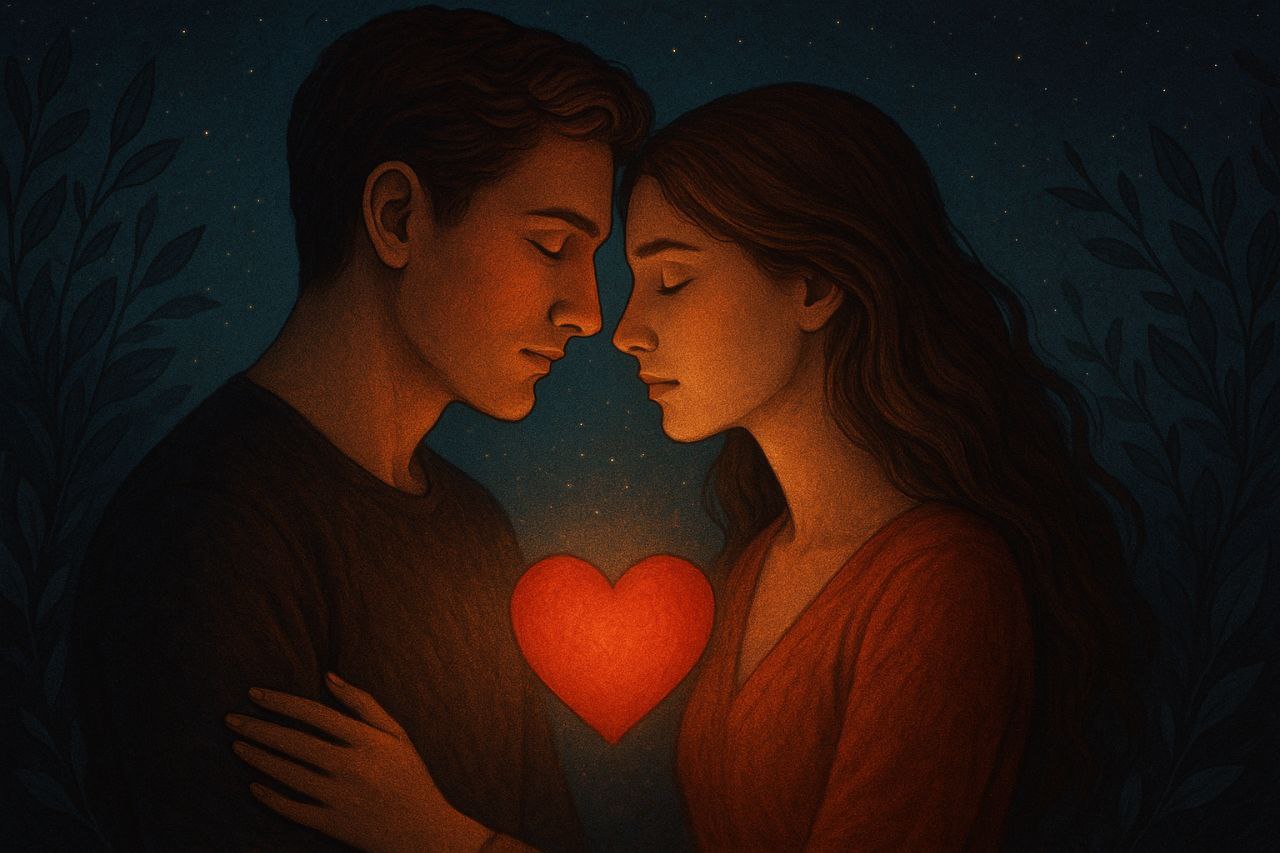
Saying someone “I Love You” is not mere words; it is the profound feeling expressing itself when heart stirs and craving comes out of the soul.
But for today’s generation, saying I Love You is nothing more than a craze.
For them,
◓ Infatuation is love.
◓ Attraction is a sign.
◓ Logic is a hindrance.
◓ Instant gratification is a kick.
◓ Lust is everything.
The outcome of this delusion:
> They use or get used by others.
> They avenge or die.
And finally,
> They leave or become left.
This is the whole cycle; they call ‘Love’ or ‘Heartbreak’.
Now the question is:
Is this love…?
So in essence, let’s resolve love through both: Science and Soul.
🧠 What is love in science?
There are five love neurochemicals that rise and fall from first spark to long-term bonding:
1. Dopamine (feel good hormone)
It’s a “reward-seeking hormone”. In love, it fuels the feeling of “wanting”, not just “liking”. It makes the person seem uniquely rewarding, making you think about them constantly, crave their presence, and feel a rush when you connect.
In short, dopamine makes love thrilling, energizing, and rewarding – it’s the brain’s way of saying, “This is important, pay attention!”
⦾ Dopamine Timeline of Love:
In First Spark (seconds–days)
— Sharp rise, intense pleasure from seeing/meeting or even thinking about the person.
Infatuation/Obsession (weeks–months)
— High, reinforces desire and pursuit.
Deepening Romance (months–2 years)
— Still high, but stabilizing.
Long-Term Attachment (years–decades)
— Moderate, spikes during intimacy/adventures/shared achievements.
Rekindling or Decline
🔼 Rises again with novelty, excitement, romantic gestures.
OR
🔻 Declines with neglect or monotony.
2. Norepinephrine (Excitement & Alertness)
It works hand-in-hand with dopamine in early stages. In love, it’s responsible for that racing heart, fast breathing, sweaty palms, shaky voice feeling.
It boosts alertness and memory, helping you notice every tiny detail of the person you’re attached to.
⦾ Norepinephrine Timeline of Love:
In First Spark
— Sharp rise, adrenaline-like rush, racing heart, fast breathing, intense emotional excitement.
Infatuation/Obsession
— High, butterflies, sleepless excitement.
Deepening Romance
— Slight decline, less nervous tension.
Long-Term Attachment
— Low baseline, can spike with novelty/adventure/shared challenges.
Rekindling or Decline
— Rises with surprises/adventure, or stays low with monotony.
3. Serotonin (Mood & Obsession)
It acts like the brain’s “stop signal hormone” for intrusive or repetitive thoughts. In the early stages of love, serotonin levels often drop, which means there’s less braking on the dopamine-driven reward system. This imbalance makes the emotional significance of those intrusive thoughts even stronger, fueling obsession and fixation on the person.
⦾ Serotonin Timeline of Love:
In First Spark
— Drops, increases obsessive thoughts.
Infatuation/Obsession
— Low, obsessive focus on the person.
Deepening Romance
— Moves towards normal.
Long-Term Attachment
— Normalized
Rekindling or Decline
— Stable
4. Oxytocin (Bonding & Trust)
It’s the “bonding hormone”. In love, it helps deepen intimacy and strengthens the long-term emotional bonds and trust that build over time. It is the key hormone that makes you feel safe and emotionally connected from affectionate touch.
⦾ Oxytocin Timeline of Love:
First Spark
— Minimal
Infatuation/Obsession
— Starts rising during intimacy.
Deepening Romance
— Higher, emotional intimacy growing.
Long-Term Attachment
— High, strong emotional trust.
Rekindling or Decline
— Strengthened by physical/emotional closeness.
5. Vasopressin (Commitment & Security)
This harmone is also known for its role in bonding. It works with oxytocin, and helps build and maintain stable, lasting relationships. In love, it contributes to feelings of commitment, loyalty, and long-term attachment with the person.
⦾ Vasopressin Timeline of Love:
In First Spark
— Minimal
Infatuation/Obsession
— Still low
Deepening Romance
— Starts rising with shared goals.
Long-Term Attachment
— High, long-term commitment and stability.
Rekindling or Decline
— Maintained if bond is secure.
To sum up,
Early love is dominated by (dopamine + norepinephrine) spikes and serotonin drops, which is why it feels thrilling, obsessive, and energizing.
Later love is dominated by (oxytocin + vasopressin), creating trust, comfort, and stability.
Passion can be reignited by re-triggering dopamine/norepinephrine (through novel experiences, adventures, playfulness, shared goals or challenges).
And “Heartbreak”?
It’s a rush of cortisol, the “stress hormone”. It responds to emotional pain and can stay elevated to help your body cope with ongoing stress. When it spikes, the mind races, the body panics, sleep shatters, and appetite fades. It can influence the immune system, metabolism, and mood over hours or days.
What is Love in Soul❓
Love at the soul level is true love, and it’s not superficial, to the seen, to the physical beauty.
It’s when you feel the unseen, the inner beauty.
It’s like that magnetic force where two opposite poles attract to each other to the point they become inseparable.
It’s when that person becomes your very mirror, and you can meet your trueself, you can be just you, unfiltered you.
It’s where is no fear of judgement, no fear of vulnerability.
And it’s not an instant act. It never happens in the first spark; it takes time to see, to feel, to trust, to expose.
It’s when you feel connected with their essence, with their everything: inner, outer, little, big, the whole of them.
At this point, you surrender.
Remember,
If you love someone, at that time, you have to submit yourself to that person. You should be committed, devoted, and loyal for the whole of your life.
When you love,
You need to resist seeking novelty with any other person.
Let go of the expectations.
And give your all.
Yes, you have to shed all the expectations in love. Why?
Because:
“Expectations weaken a person,
And a weak person can never love at the soul level.”
In True love, you find life in loving, and love becomes a kind of worship, a ritual, a choice, a decision for you.
So love, but love consciously.
Let love be your choice and decision,
Not just short-term obsession.
